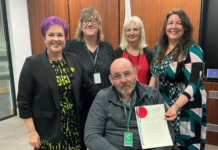STEVE BISH SHARES A HANDY GUIDE TO PROBATE TERMINOLOGY TO HELP EXPLAIN A PROCESS THAT CAN SEEM DAUNTING
AN A-Z guide explaining the terms that relatives will come across when handling a loved one’s estate has been issued by an expert in a bid to try and help demystify the process.
The advice comes in the wake of a survey by the Association of Lifetime Lawyers, showing
how nearly half of UK adults have not made a will and a third would rather watch TV than write their will.
It also found that 32% said they haven’t made a will because they do not know how to get started.
A study by Co-op Legal Services has also found widespread confusion over inheritance and estate issues.
Some 31% of people for example did not realise that an estate passes to the Crown if a person has no blood relatives and does not leave a will.
One of the UK’s leading experts on the subject, Steve Bish, fears many people are being needlessly put off by the process
Steve, a Wills and estates expert, said: “The process of probate can seem daunting so an explanation of the terminology involved may help to avoid errors that can delay the whole process.
“Dealing with someone’s estate after their death can involve a number of different probate terms.
“We have put together a glossary of these to highlight some of the most commonly used words and phrases to help explain the probate and administration process.”
Here, Steve explains the terms that relatives will encounter when embarking on the process of probate:
Assets – all items owned by the deceased, to include money, property, investments and valuables.
Bequest – a gift left to someone in a Will.
Chattel – personal property, other than money, securities or business assets.
Deed of Variation – where the beneficiaries of a Will agree to change its terms. Usually done to make it more tax efficient or to benefit someone who wasn’t included in the original Will
Executor – deals with the administration of the deceased’s estate. An executor is appointed by the deceased in their Will.
Funeral wishes – It is possible to incorporate your funeral wishes into your will but these are not binding and we always recommend that you let those who may be organising it know of your wishes.
Grant of Probate – the legal document issued by the Probate Registry giving an executor legal authority to administer the deceased’s estate. This is the document that the executor will need to apply for where the deceased left a Will. A Grant of Probate or Letters of
Administration is not needed in the case of a small estate, usually defined as less than £30,000.
Heir – a person who is legally entitled to the property of a deceased person, more commonly known as a beneficiary.
Intestacy – where the deceased died without leaving a Will.
Joint tenants – a form of property ownership between two or more people who share equal ownership and equal rights to the property.
Kin – a person’s family and relations are that person’s next of kin.
Legacy – another word for bequest, this is a gift left to someone in a Will.
Mediation – an informal process for helping people who have a dispute to resolve the dispute without going to Court.
Notice of Death – the document required to transfer property owned as joint tenants into the sole name of the surviving owner.
Offer of Compromise – a written offer made from one party to another party stating the terms on which they would be prepared to settle the dispute between them without going to Court.
Probate – this is often used to refer to the whole estate administration process as well as to the Grant of Probate itself.
Qualified Witness, the persons who are authorised to witness the testator signing their Will. They must be over the age of 18, independent and have capacity.
Rules of Intestacy – when someone dies without a Will, their estate is distributed to beneficiaries in the order listed in the Rules of Intestacy. These rules set out those who are entitled to inherit in a set order of preference, starting with the deceased’s spouse and children.
Survivorship destination – a survivorship destination is a provision often inserted into the title deeds of a property which ensures that title is automatically passed to the other person or persons named on that title.
Testator – the person who made the Will.
Undue Influence – where a will can be deemed invalid because the will maker was coerced or influenced by another person to include something in their will that is against their true wishes.
Valuation – the value of the estate at the time of death.
Witnessed – a will must be signed and witnessed to be valid so all 3 people (will maker and 2 witnesses) must be present together and must sign.
X – plus Facebook and other social media sites form part of our digital assets. When drafting a Will, most people will consider what happens to their physical assets such as their savings and their home. However, we are becoming increasingly reliant upon our digital assets and it is therefore important to consider how you want your digital assets to be distributed after your death.
You – can make your own will easily enough with a DIY kit. However, nobody with any professional experience would recommend this due to the many potential pitfalls.
Zoom – as of 12 Jan 2022, wills can continue to be witnessed via Zoom in England and Wales, measures first brought in during Covid.
If you would like further information on any estate planning issue, contact Steve Bish via https://www.sbishestateplanning.co.uk/about or on 01727 220930 or email contact@sbishestateplanning.com
Help keep news FREE for our readers
Supporting your local community newspaper/online news outlet is crucial now more than ever. If you believe in independent journalism, then consider making a valuable contribution by making a one-time or monthly donation. We operate in rural areas where providing unbiased news can be challenging. Read More About Supporting The West Wales Chronicle





















